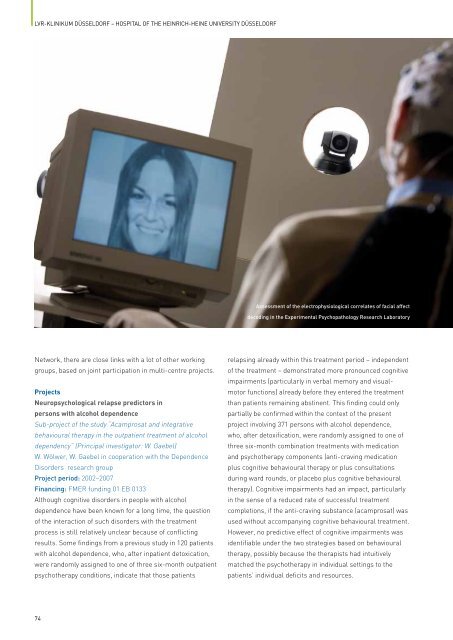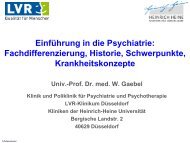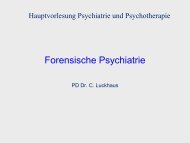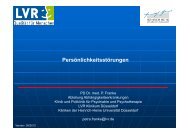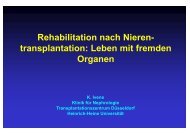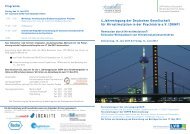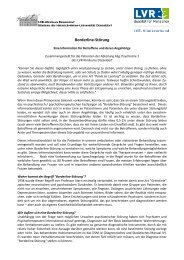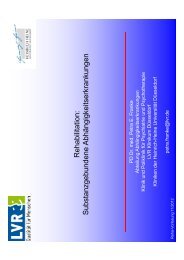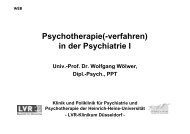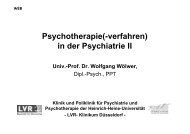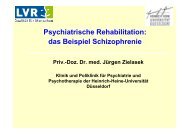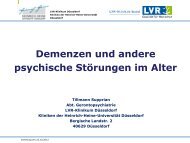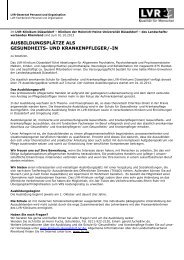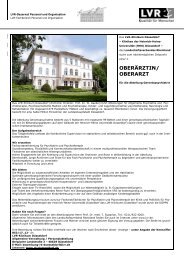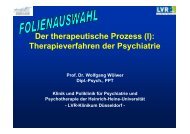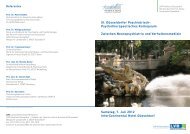LVR-Klinikum Düsseldorf Hospital of the Heinrich-Heine University ...
LVR-Klinikum Düsseldorf Hospital of the Heinrich-Heine University ...
LVR-Klinikum Düsseldorf Hospital of the Heinrich-Heine University ...
Create successful ePaper yourself
Turn your PDF publications into a flip-book with our unique Google optimized e-Paper software.
<strong>LVR</strong>-KLINIKUM DÜsseLDORF – hOsPITaL OF The heINRIch-heINe UNIVeRsITY DÜsseLDORF<br />
Network, <strong>the</strong>re are close links with a lot <strong>of</strong> o<strong>the</strong>r working<br />
groups, based on joint participation in multi-centre projects.<br />
Projects<br />
Neuropsychological relapse predictors in<br />
persons with alcohol dependence<br />
Sub-project <strong>of</strong> <strong>the</strong> study “Acamprosat and integrative<br />
behavioural <strong>the</strong>rapy in <strong>the</strong> outpatient treatment <strong>of</strong> alcohol<br />
dependency” (Principal investigator: W. Gaebel)<br />
W. Wölwer, W. Gaebel in cooperation with <strong>the</strong> Dependence<br />
Disorders research group<br />
Project period: 2002–2007<br />
Financing: FMER funding 01 EB 0133<br />
Although cognitive disorders in people with alcohol<br />
dependence have been known for a long time, <strong>the</strong> question<br />
<strong>of</strong> <strong>the</strong> interaction <strong>of</strong> such disorders with <strong>the</strong> treatment<br />
process is still relatively unclear because <strong>of</strong> conflicting<br />
results. Some findings from a previous study in 120 patients<br />
with alcohol dependence, who, after inpatient detoxication,<br />
were randomly assigned to one <strong>of</strong> three six-month outpatient<br />
psycho<strong>the</strong>rapy conditions, indicate that those patients<br />
74<br />
Assessment <strong>of</strong> <strong>the</strong> electrophysiological correlates <strong>of</strong> facial affect<br />
decoding in <strong>the</strong> Experimental Psychopathology Research Laboratory<br />
relapsing already within this treatment period – independent<br />
<strong>of</strong> <strong>the</strong> treatment – demonstrated more pronounced cognitive<br />
impairments (particularly in verbal memory and visualmotor<br />
functions) already before <strong>the</strong>y entered <strong>the</strong> treatment<br />
than patients remaining abstinent. This finding could only<br />
partially be confirmed within <strong>the</strong> context <strong>of</strong> <strong>the</strong> present<br />
project involving 371 persons with alcohol dependence,<br />
who, after detoxification, were randomly assigned to one <strong>of</strong><br />
three six-month combination treatments with medication<br />
and psycho<strong>the</strong>rapy components (anti-craving medication<br />
plus cognitive behavioural <strong>the</strong>rapy or plus consultations<br />
during ward rounds, or placebo plus cognitive behavioural<br />
<strong>the</strong>rapy). Cognitive impairments had an impact, particularly<br />
in <strong>the</strong> sense <strong>of</strong> a reduced rate <strong>of</strong> successful treatment<br />
completions, if <strong>the</strong> anti-craving substance (acamprosat) was<br />
used without accompanying cognitive behavioural treatment.<br />
However, no predictive effect <strong>of</strong> cognitive impairments was<br />
identifiable under <strong>the</strong> two strategies based on behavioural<br />
<strong>the</strong>rapy, possibly because <strong>the</strong> <strong>the</strong>rapists had intuitively<br />
matched <strong>the</strong> psycho<strong>the</strong>rapy in individual settings to <strong>the</strong><br />
patients’ individual deficits and resources.


